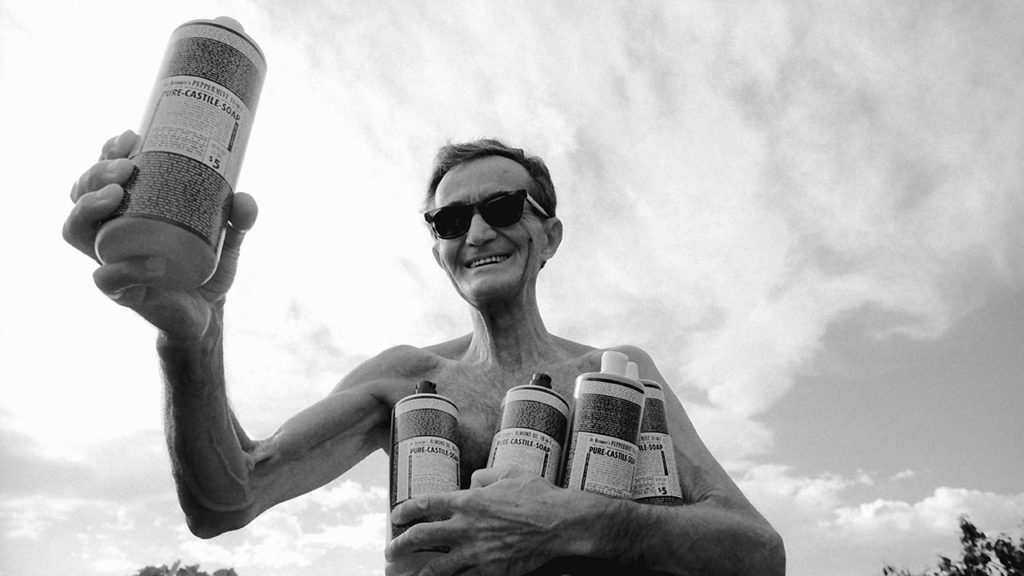
The label came first.
I imagine how it goes with other companies: A new company is launching its first product. A group of marketing minds brainstorm what the Dr. Bronner’s label should look like. What would attract customers? What words, what colors would be the most enticing and connote the right subliminal meaning?
That’s not our story. The Dr. Bronner’s label was written first, before there was a product on which to put it. There was nothing subliminal about it.
If you’re not familiar with what I mean by “the label,” let me catch you up: The label on Dr. Bronner’s Liquid Castile Soap is coated so completely with 5.5 pt. text that it almost fades into texture. It’s not a gimmick. It’s not a style. It was a deeply personal message, a life’s mission from my grandfather, Dr. E.H. Bronner who sought to unite all people in peace, love, and personal well-being. It’s what started the whole company now known as Dr. Bronner’s.
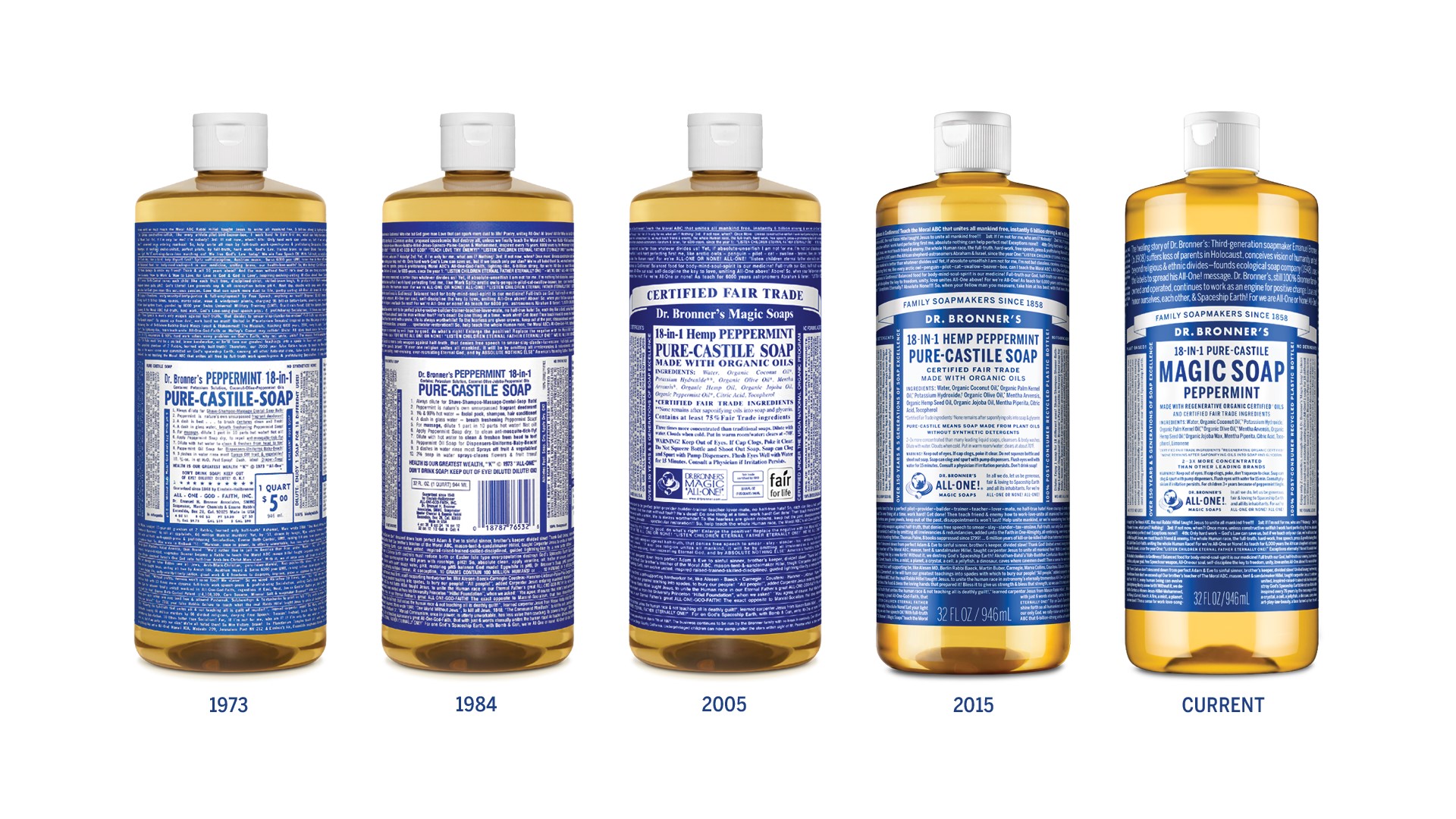
Here’s an excerpt from his autobiography, featured on liquid soap bottles since 1960:
In ’47, after father-mother-wife murdered, ourself tortured-blinded, we wrote this poem: “To keep my health! To do my work! To love, to live! To see to it I gain & grow & give & give! Never to look behind me for an hour! Never to wait in weakness nor to brag in power! Always working, searching for more truth, more light! Always writing, teaching what I found good & right! Robbed-starved-beaten-blinded, wide astray! Back with the full-truth I’ve gained, back to the way: Smile, help teach the whole Human race, the Moral ABC of All-One-God-Faith, Lightning-like strong & we’re All-One! All-One!”
I can’t tell you the story of the Dr. Bronner’s label without telling you my grandfather’s personal history. They are inextricably intertwined.
My grandfather was a third-generation Master soapmaker, trained under the German Craftsman system, which involved years as an apprentice, then journeyman, and finally examination and qualification as a Master. Although his family owned the successful Madaform soap company in southern Germany, he did not intend to converge his soapmaking with his philosophy so completely.
He was born in 1908 in Heilbronn, Germany, the only son and oldest of four children (one died in infancy). Although his family was Jewish, his primary reason for emigrating to the U.S. was not the rise of Nazism, not yet much threat, but rather a break with his father. At 21, Emil, as was his given name at birth, was already starting to think outside the Orthodox Jewish views of his family. His dad did not approve and eventually issued the ultimatum to his son: either nix the philosophizing or leave. My grandfather chose the latter. Based on my knowledge of him later in his life, his choice is not surprising.
He departed Hamburg on December 12, 1929, aboard the SS Deutschland, an ocean liner nicknamed “The Cocktail Shaker” for its incessant vibrations. His third-class ticket indicates he did not have surplus funds, which likely means his father did not financially support his son’s trip, though he would have been able to with the family’s financial security at the time. The Deutschland arrived in New York ten days later, on December 22.
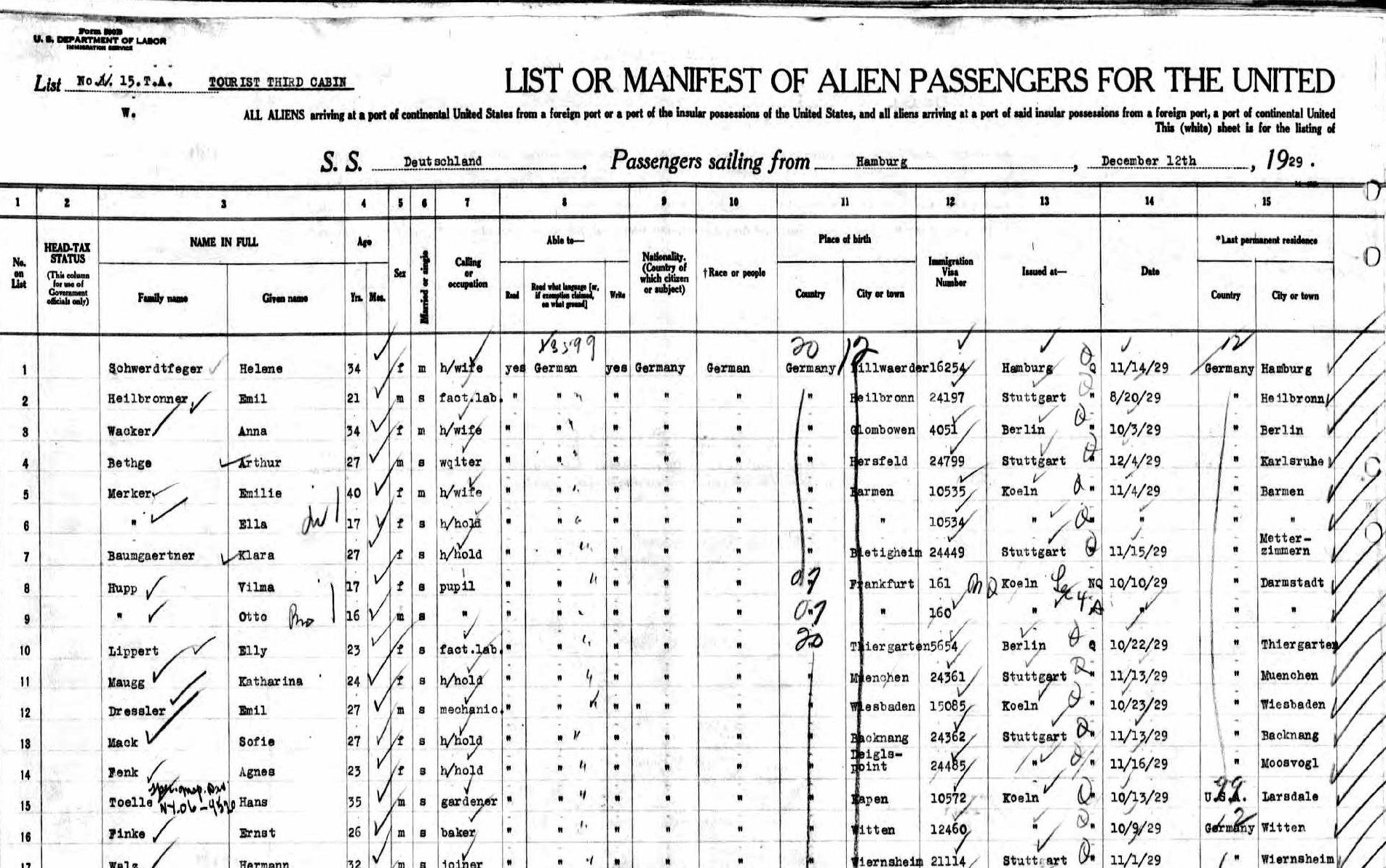
He spent his first decade in America poor but progressing. The 1930 census found him at the YMCA in Milwaukee, but documents in the coming years indicate he worked as a soapmaking consultant, married a fellow German immigrant Paula Wohlfart (whose story as the illegitimate daughter of a nun and a priest is for another time), and had three children: Ellen, Ralph, and James (my dad). He became naturalized in 1936, two days prior to the birth of Ralph, at which point Emil Heilbronner became Emanuel Theodore Bronner. We don’t know with certainty why he chose the first two names, though Emanuel was the name of his grandfather and Theodore means “gift of God.” We do know he dropped the Heil because of its association with “Heil Hitler.” Later, he adopted the honorific “Dr.” perhaps because he considered it the equivalent of “Master,” a rank in Germany which did not exist in the States. Later, he wrote his name as Dr. E.H. Bronner. The origin of the “H” or what it stood for is hazy, though it might be a nod back to the original “Heilbronner.”
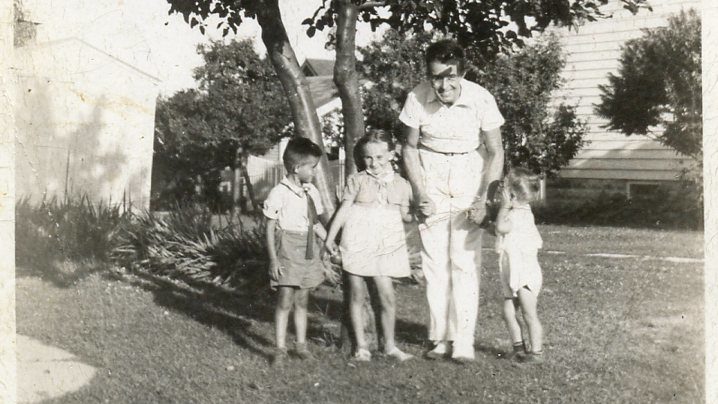
Then came a period of tremendous tragedy. The family back in Germany only partially heeded his urgings to leave. His sister, Luise headed to America in 1936 where she became one of the earliest female professors of German Language and Literature at the University of Massachusetts – Boston and an accomplished poet. His other sister, Lotte went to Palestine in 1938 to join the Zionist movement, living on the Ein Gev kibbutz. This was a family of trailblazers. His father, my great-grandfather Berthold, however, did not listen to his son’s warnings, insisting that his homeland would never betray him and that Hitler was a passing phase. The siblings attempted several times to get their parents out of Germany, such as in 1938 the sisters met their parents in Switzerland for a supposed family vacation with the intention of escorting them on to America. When their father learned of their plan, he refused to go.
The “Decree on the Exclusion of Jews from German Economic Life” (Verordnung zur Ausschaltung der Juden aus dem deutschen Wirtschaftsleben) in 1939 eventually led to the forced Aryanization of Jewish-owned businesses including the Heilbronners’ Madaform soap factory. The letter from the new owner, Dr. H Bauder, cheerfully announced that the famous Madaform soap company had “passed into Aryan hands.” It was also illegal by this point for Jews leaving Germany to carry any capital with them, a discouragement for Jews of means such as Berthold Heilbronner.
How the family survived for the next two years I cannot imagine, but in 1941, Berthold agreed to allow his daughter Luise to pay for and arrange emigration. Approval came through for their visas on December 5, 1941, two days before Pearl Harbor and 6 days prior to Germany’s December 11 declaration of war on the U.S., which was quickly reciprocated. At this point, emigration was impossible.
Three months later on March 31, 1942, Berthold Heilbronner, his wife Franziska, and sister-in-law Friederike were arrested and deported to concentration camps. All three were first sent to Theresienstadt in then Czechoslovakia where Berthold and his sister-in-law Friederike died shortly after arriving of illnesses brought on by the wretched conditions. After two years there, Franziska was sent to Auschwitz where she was executed in 1944. Emanuel received a postcard from his father with all but one line censored out: “You were right. Your loving father.”
News of his parents’ demise, in addition to the trauma of watching his adopted homeland war against his native homeland, weighed heavily on Emanuel and Paula. Emanuel says Paula was never strong, and news of her in-laws’ deaths proved unbearable for her. Experiencing a breakdown, of which we have few details, she entered the Manteno State Hospital, an asylum, in which she wasted away, dying in 1944. Emanuel said she weighed 65 pounds at her death.
These personal tragedies compounded with world developments impressed upon my grandfather the conviction that the world truly was on the brink of destruction. Additionally, with the rise of the nuclear age, Emanuel felt, like many, that the world could annihilate itself with the push of a button. He thought this was a power that humanity was not prepared to control.
He also saw the world heading in the wrong direction environmentally with the advent of “better living through chemistry,” a tagline inspired by Dupont Chemical, beginning in 1935 effectively persuading the public that nature is unpredictable and untrustworthy. Business and chemical development is much more reliable and can synthesize what mankind needs, largely from petrochemicals. With great perception, Dr. Bronner foresaw the shortsightedness of that thinking, the pollution and habitat destruction it would ultimately create.
My grandfather felt all of this keenly. While many in the same circumstances would be driven to bitterness, despair, anger, or at the least resignation, he launched in the opposite direction. He saw the need more than ever to unify the world, to call out humanity’s commonalities, to highlight the way in which people are similar in their aims and ethics, to call each individual to action wherever they find themselves. He emphasized we are all fellow travelers on God’s Spaceship Earth, where “there is neither East nor West, nor border, breed nor birth.” This is the essence of what he came to call his Moral ABC. It’s the basics. The tenets which all people groups have in common, starting out with the individuals:
“1st: I am not for me, who am I? Nobody!”
“2nd: Yet, if I am only for me, what am I? Nothing!”
And then proceeding through the principles that lay out each person’s responsibilities and role in the world. He cites many examples of how these principles appear in people groups, cultures, and religions around the world and across time – even within the natural world. He cites nature – arctic owls-penguin-pilot-cat-swallow-beaver-bee – philosophy (Thomas Paine), science (Albert Einstein, Cousteau), education (Marva Collins), linguistics (Zamenhof). He includes quotations from many sources, “slightly assisted” as he would say, with his own phrases for emphasis.
His unique style of expression was part prose, part poetry with no superfluous words. It is direct and strident, with copious repetitions of the phrase which summarizes his whole message: “All-One!”
Also iconic are the long, hyphenated strings reminiscent of German compound words, which stack ideas together to come up with new cohesive concepts, such as his description of a swallow as the “perfect pilot-provider-builder-trainer-teacher-lover-mate.” The very structure of his language communicates the intensity and urgency of his message: that love and unity need to be realized and need to be realized now.
He was untiring in his efforts to get this word out. He was passionate. His words were about peace and active care for ourselves, each other, and the world around us. However, with his heavy German accent, rigid posture, and emphatically clipped way of speaking – he spoke exactly as he wrote – he could sound unnerving to someone who did not take the time to listen to his words. Furthermore, his topics did not resonate with the 1940s audience: returning to nature and peace across cultural, religious, and ethnic divides.
Unfortunately, this manifested during a speech he was giving at the University of Chicago in 1946. Arrested on the charge of speaking without a permit, he was soon after committed to the Elgin State Asylum. His sister Luise who was summoned from Boston, was pressured to sign the committing papers, which cited mental instability. In Elgin, he underwent electroshock therapy, to which he attributed his eventual blindness. Though he tried unsuccessfully to escape twice, he found some purpose in the forced manual labor – bricklaying – later saying this gave him a connection with the common man, and he later encouraged all of his grandchildren to spend some time in life, by choice, working with our hands.
On his third escape attempt, he succeeded. The story passed down through the family is that Luise had come to visit and had taken him out to lunch. While she was in the restroom, he stole $5 out of her purse and hitchhiked toward California. In Las Vegas, he made the mistake of mentioning to his ride that he had recently escaped from a mental asylum. He was promptly dropped, near penniless, in Vegas. With one lucky spin of the roulette wheel, he found enough funds to make it the rest of the way to Los Angeles.
In Los Angeles, he found a more receptive audience. Pershing Square, still to this day a hotbed for speakers with cutting-edge ideas, became his platform. He was grateful to have an outlet for his ideas, and began giving away to listeners small bottles of his family’s unique liquid Castile soap, scented with skin-tingling peppermint essential oil, which he brewed up in his tenement apartment. Eventually, though, he noticed that people would come for the soap and not stay to engage with the ideas. Unthwarted, Emanuel came up with a plan to print his ideas on the label of the soap, so that when people took the soap and inevitably were closeted in the bathroom with nothing to read, would turn to the words on label.
Thus the Dr. Bronner’s label was born.
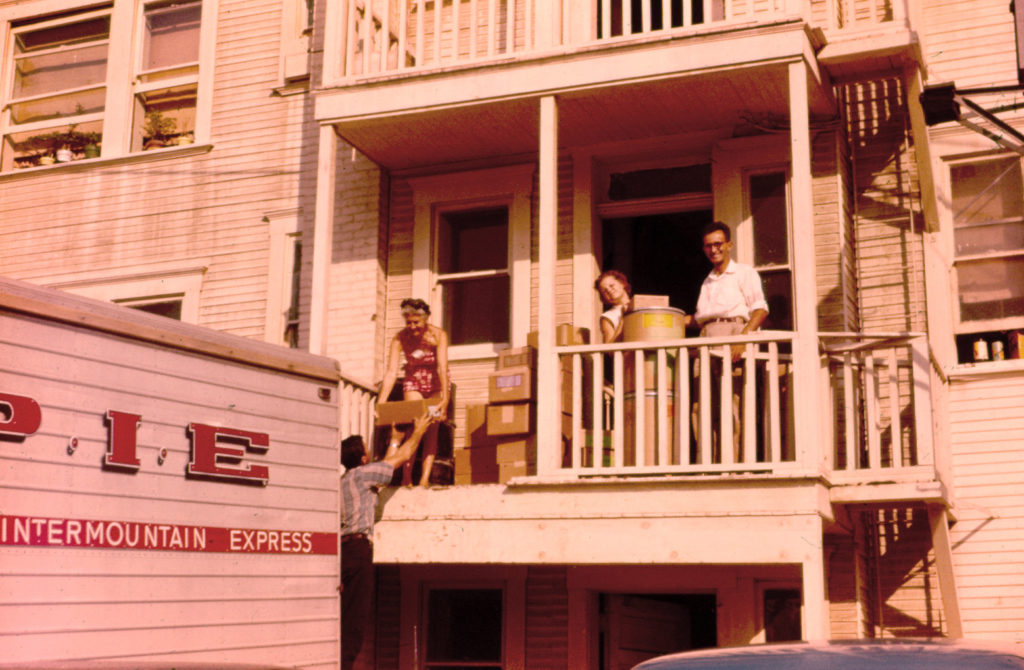
Eventually more people wanted the soap than he could reach during his talks, so he started selling it, mostly via small mom-and-pop (as they all were at the time) health stores. He saw stores as further distribution points for his philosophy, with proceeds going to further outreach of his ideas. The demand became greater than he could produce out of his apartment, so on Saturdays he rented the use of a reactor at a nearby chemical manufacturer.
As the ‘60s arrived, the audience he had always hoped for discovered him. Hippies, free thinkers, attenders of Woodstock embraced his message and his authenticity. He had been talking love, unity, and a return to nature long before anyone was ready to hear it. Both the soap and the label took off.
Dr. Bronner opened his home to eager listeners, hosting regular evening chats. He moved down to Escondido, CA – in the outskirts of San Diego – where land was cheaper and more abundant. Plus, there were countless acres of avocados, which he deemed nature’s perfect food – they’re mentioned on the Dr. Bronner’s label, too – when combined with his Balanced Mineral Seasoning, a special blend he developed which provided optimal nutrition. People followed him.
His sales grew to where the factory in Los Angeles, which now employed my dad Jim, freshly out of the Navy, was commissioned to make his formulation during regular operating hours. Only two people knew the secret formula: Dr. Bronner and Jim Bronner.
Growing sales meant his ideas were getting into more and more homes. He operated under the conviction that this was a not-for-profit organization purposed to spread these ideas with the name, “All-One-God-Faith.”
He was busy. He was constantly revising the label, which as his vision declined, was firmly ensconced in his head – every word, every exclamation point. Up to the end of his eyesight, he edited and rewrote using a red crayon, which was the last implement he could see well. Then he dictated his revisions. If he didn’t have anyone at hand, he would call up his son Ralph in Milwaukee or one of his grandkids and have them take notes. My cousin Eric knew if the phone rang at 6:00 am (which was 4:00 am California time – I’m glad he didn’t call us!), he would answer, “All-One!” because who else would it be? (My grandfather liked to start and end every conversation with a hearty “All-One!” If we didn’t do it with enough zest, we’d have to try again.) On these calls, he might ask for some research – Eric’s family kept the Encyclopedia next to the phone for just this purpose – or he might need to hear a part of the label in someone else’s voice and give some edits or he might need someone to capture a new phrase.
Dr. Bronner always felt he was near completion, and occasionally would announce triumphantly that the label was finished. Until the next idea came along. Eventually he’d run out of room on the label, even with impossibly tight text running every which way. Then he’d come up with a new scent with a new label to fill. Even to this day, the different scents in the quart size have different portions of his writings on the labels.
He also communicated ceaselessly with anyone who wanted to talk about the label. Sometimes for hours. His home number was easy to find – at times it was even on the label – so anyone could call.
All this time, there was no paid marketing behind the soap. It spread by word of mouth, thanks to incredibly loyal customers, who resonated with the soap or the label, or both, many of whom are still with us today. They were excited to tell their friends about the tingly soap with the crazy label. Even today, I regularly get emails from new customers that start with, “I was at my friend’s house and found this whacky bottle in his bathroom covered with writing. I’ve never used anything else since.” It’s still our best recommendation.
Word also spread via my uncle Ralph’s “soap trips.” On his breaks from teaching middle school English in inner city Milwaukee, Ralph would load up his van with soap, pick a city, and visit every health store, giving away soap, telling the unusual story behind it and its label, and playing folk music. You could always find Uncle Ralph, which everyone called him, by following the children who flocked to him. He was like the Pied Piper of soap.
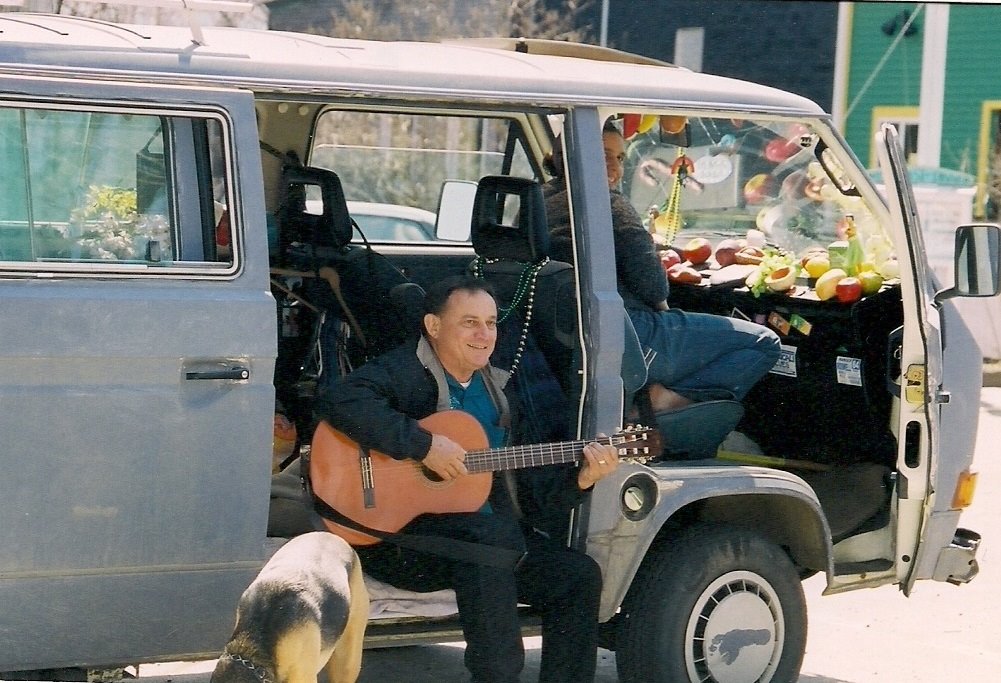
But it all came back to the label. Dr. Bronner received many solicitations from people who wanted to private label the inimitable soap. Some felt the label was just a little too out there, a little too boundary pushing. Wouldn’t the soap sell more if it had a simpler label that left off the unexpected references to Aknathan-Bahá’u’lláh-Buddha-Confucius-Moses-Hillel-Jesus-Mohammed? Absolutely not. There was no soap without the label. The label was not there to sell the soap. The soap was there to distribute the label. If someone did not want the label, then they could not sell the soap.
Even when the soap sold well, Dr. Bronner did not live lavishly on his profits. He championed a concept called Constructive Capitalism, which did not originate with him, but he put it into practice. The idea, in his words, is to “share the profits with the workers and the earth from which you made it!” And so he paid workers generously and gave away much of the profits. You would never know from the modest, unairconditioned, dimly lit one-story ranch house in which he lived and worked that he was at the helm of a successful company.
The IRS eventually, through court action in 1973, required Dr. Bronner to regard the company as a business and not a not-for-profit organization, and to pay taxes as a business. He still continued to give much of his proceeds away to benefit causes in which he believed.
All of this is manifest in the current generation – my brothers, husband, and mom – who run Dr. Bronner’s today. The label is preserved. Any changes are made with the utmost care, keeping true to the spirit and intent of Dr. Bronner’s work. The company today supports myriad causes, most of which have nothing to do with soap, for example in 2019 5.6% of the annual proceeds ($7.4M) went to charitable causes. Beyond financial contributions, Dr. Bronner’s has been on the forefront of activism in pushing for strong organic, fair trade, and now regenerative organic standards, as well as fighting for social causes such as drug policy reform, fair pay, and racial justice among others. There are also caps on executive salaries at 5x that of the lowest vested full-time employee. Employees receive the profits through generous salaries, 100% healthcare coverage, childcare assistance, bonuses, profit sharing, and tenure awards. It is still a privately owned company, organized as a Benefit Corporation, because no public shareholders would approve of the profligate giving away of so much money.
Even to this day, the label is at the core of Dr. Bronner’s, the company, directing every decision in business, relationships, and charity. It is articulated in six Cosmic Principles, drawn from Dr. Bronner’s own writings:
- Work Hard! Grow!
- Do right by customers
- Treat employees like family
- Be fair to suppliers
- Treat the earth like home
- Fund & Fight for what’s right.
Not everyone who is interested in the soap will agree with the label, but it starts conversations. That was my grandfather’s key. He did not mind if people disagreed with him, so long as they were willing to engage. What frustrated him the most were people who did not want to engage at all.
His entire message is summed up in one overarching statement at the core of the company today:
In all we do, let us be fair, generous, and loving to Spaceship Earth and all its inhabitants. For we’re All-One or None! All-One!
Further reading
- The Five Soapmaking Locations of Bronner Family Soaps
- How Dr. Bronner’s Honors Its Label
- Dr. Bronner’s For Newbies





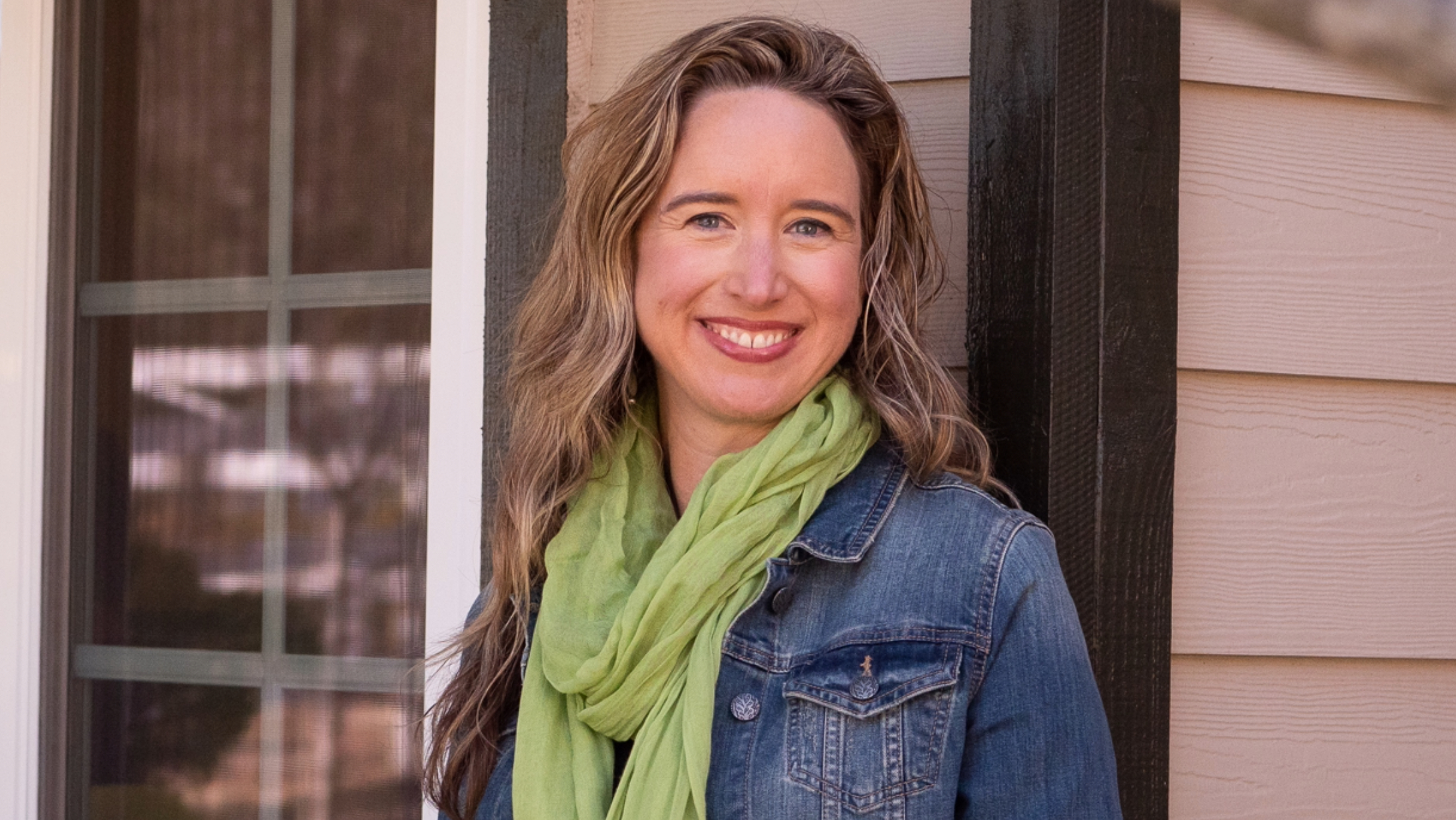

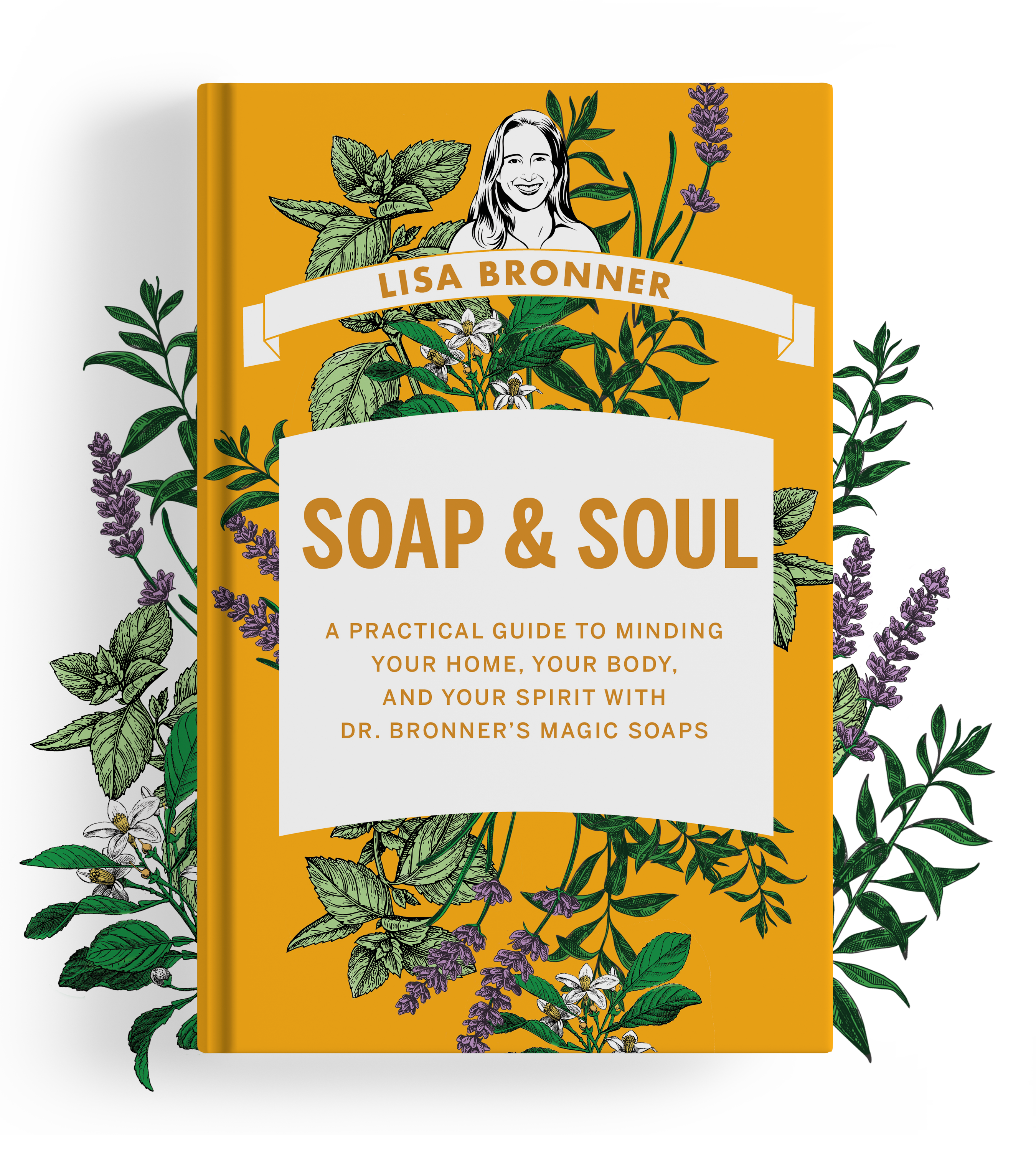
Hi Lisa, I’ve been using Dr. Bronner’s soaps for many years and loved getting this in-depth history of the family. So fascinating! I also love the body lotion and toothpaste. Today I just discovered your chocolate bars and now I’m in trouble. I chose the dark chocolate almond butter and will have to go back for the other flavors. Truly delicious!!
Hi Mary- Thanks for being a long-time customer. Ha! Sorry about the chocolate. It is pretty delicious, I must say!
Since my first bottle in the 70s, it seemed like I knew the man behind the writing on the bottle. Dr. Bronner’s message resonated with me from the beginning. It’s a profound experience to read his story here and know he was exactly the man I always envisioned. His message and the soap that transported it to me have been an important part of my life. Thank you for continuing his legacy.
Hi Cheryl- Thank you for your kind words. I’m glad my grandfather’s message resonated with you.
Captivating! Sad to begin with; a good life to the end. Never used your product – I may try it out.
I think my Mom used this.
Thank you
Thank you for the history of the label! Such a wonderful product!
Thanks for reading, Jay! I’m glad it resonated with you.
It is right to say that I love your family so much! Bronners has been my soap since the 70s… and now my grown children’s choice, also. Thank you for keeping it all Alive!
This story of the label was an excellent read. My heart is filled.
Hi Laurie- It’s always a treat to hear from our long-time customers and especially so when we hear our soap has been passed won to the next generation!
Such an interesting story, I’ve always wondered about the label so I’m glad I finally checked out your website. I absolutely love how the best soap in the world was second to his message of peace and unity! I was already sold on the product but finally knowing the history just makes me love you all even more! Thank you for your commitment to natural quality and preservation of Dr. Bronners unique and inspiring message!
Hi Brandon- Thanks for the kind words! I’m glad you landed here too and that this article and my grandfather’s message resonate with you.
I cannot say how much Dr. Bronner soap has impacted my life. And all that you say and do it works!!!All One or All None!! How true this is the statement made by Emanuel Bronner. Your company is the greatest on earth and I hope to be there when I pass to give my funds to Dr. Bronners. I believe in the company that I will give any money that I have for them. Thank you Lisa and family. Your work is incredible.
Hi Eugene – Thank you deeply for all your kind words. I’m so glad you’re in sync with what we are doing. It’s all of us working together in this world that will bring lasting change.
I’ve been using Bronners for 18 years and I’ve always wondered about the label. What a tragic and fascinating story. I really appreciate how the family has stayed true to Dr. Bronner’s mission and wishes in making business decisions. That is respectable and makes me want to choose Bronners over anything else. Thank you for sharing this story. I only found it because of a link in the facebook comments on the Bronners page. It’s an answer I didn’t think to look for but wanted to know.
Thanks for reading, Heather! I’m glad this article and our company history resonate with you!
What BEAUTIFUL Souls your Grandfather and all of you have….thanks so much for sharing this story. I’m typing this through tears! If y’all were closer to me, I’d be more than willing to help type up your Grandfather’s thoughts. (I’m a paralegal by profession, and still type a lot today!). It would be like typing my Grandma’s stories she used to tell me over and over again….I never tired of listening to them, and miss her desperately. Many blessings to you all!
Hi Elizabeth- Thank you so much for your very kind words! It is very important to capture the stories of the generations that have come before. Your support warms my heart!
The music in the background was TOO LOUD could not really hear you when your speaking about your Grandfather.
Is there anywhere to go that you have it printed what is on the label. Where is it posted? Sad that it is so small
I would that you would have it posted on your site somewhere.
Thank you
Karen
Hi Karen – It’s lovely to hear your interest in my family’s history and my grandfather’s label. I’m sorry you found the music too loud. Was that in the video entitled, “The Man I Called Grandpa?” I will look into what can be done about that. At the moment, we do not have my grandfather’s writings posted anywhere. It is something we have grappled with and pondered how to approach it. He wrote copiously while he had eyesight, and when that failed in the late 60s, he recorded thousands of hours of thoughts on casettes. He was constantly editing and ammending his thoughts, so we have myriad versions. We have had archivists at various points, but no one has been able to get a hold on it all. All that to say, collating his writing in some other format than the bottles themselves is on our radar, but we don’t have a timeline for it yet.
Hi Lisa,
I love your blog and recipes!
I would like to read all the labels but they are too small for me to see. Is there a way to get copies in larger text?
Thanks so much for all you do for people and our planet💜
Diane
Hi Diane – This is an excellent question and I am so glad you are interested in reading the label in detail. Unfortunately we do not have it in a format that is larger. This has been on our radar, but will take a swath of time that hasn’t become available yet.
Wow! I never knew this! TY for sharing this & I will now buy the products!! Gives me hope despite all the greed & war happening today. THANK YOU SO MUCH to the Bronner family!!!
Your soap has been a part of my family for decades. I remember what we came to call the “peppermint soap” from the time I was a little boy. Many was an occasion where I read that label (long before the invention of smart phones), and both the soap and the philosophy are some of my best and strongest memories of growing up. Thank you for everything you have done and continue to do.
Hi Jared – So lovely! Thank you for sharing.
Aha! So, now I know. Thank you for sharing. It’s something I have been
curious about.
Thank you for this story! I’m 46, and our family always has had your soap. I’ve always wanted to know a full story. My grandma also used to read parts of the bottle to me while I was in the bath. The story and all that he has endured made me cry, but the fact that he kept going to spread his philosophy is amazing. He was so forward thinking. Often genius march to a different drum and can be misunderstood. I’m so happy to use all of your products.
Thank you for sharing. I have used this magical product forever- and often read the label. Now, knowing the story behind it, it gives even deeper meaning!
Dear Lisa,
Thank you for sharing this amazing story of your family and Dr. Bronner. I have been using the Peppermint soap {and the others occasionally) since about 1974, I discovered it at age 13. Its philosophy, natural ingredients, biodegradable formula, and versatility still resonate with me today at age 61. I use it every day, something I can always rely on to perform perfectly. I also enjoy many of the new products that have been introduced in the past few years. Thank you for continuing your grandfather’s legacy. He was a brilliant visionary and entrepreneur.
Thank you, William! It’s customers like you that have kept us going through the years.
Hi,
I just discovered the soap and will make foaming hand soap adding YL Essential Oils. Love, love the label actually that is what caught my eye at Natural Grocers.
Fond memories of taking a bath and learning how to read from the mysterious blue label bottle in 1975 (?)- unbeknownst to me, my grandmother was so ahead of the times and I’m proud to carry on the tradition and use it for everything! Peppermint is the one constant in my life and the scent takes me instantly back.. 🙂
Hi Anne- Thanks for sharing this! I so enjoy hearing from customers who grew on our soaps and how the use of it is passed from one generation to the next.
Thank you so much for sharing the story of your grandfather’s life and the start of this wonderful company.
I can clearly remember the night in 1972 that I first was introduced to Dr. Bronner’s Pepermint liquid castile soap. The fact that a small bottle of soap created such an explicit memory says much about that soap. Over the past fifty years Dr. Bronner’s soaps have become an essential part of my every day living, head to toe, and veggies, too!
I am so grateful for you, this company, and all that it stands for.
All One!
Pamela
All I can say”dr. Hillel Emanuel bronner”
AMEN♥️♥️🪬
I discovered this soap in 1971 and continue to use this incredible product. I use both the liquid and the bar soap but prefer the bar as it is packaged in paper. I am so thankful for the Bronner family and not only do they produce a quality product but they do the right things for our earth.
Thanks for your kind words, Bob! We so appreciate the support from our long-time customers.
Always have a bottle in my bathroom and I’ve read the label many times. This story is so great and the truth is, I find we have much more in common than I felt. Love to this family, keep up the good work
Thank you, Bonnie!
All-One always
Fascinating History!! This adds so MUCH to, until now, was unknown about my most Favorite soap to me..on his 6 Cosmic Principles I would add, however.
7.ALWAYS keep LEARNING!
Hi Sarah- Thanks for reading. My grandfather would likely agree with your #7. He was endlessly curious.
Horrendous but inspirational story. The way you run the business is also inspirational. Retired now, but tried to run my farm that way too. Started using the soap during the hippie days in Honolulu and San Francisco late seventies. Never buy any other. Buy it by the gallon. Even shave with it. Very glad to know I’m supporting a wonderful family and cause.
Hi Dick- It’s always a pleasure to hear from long-time customers. Thanks for the years of support!
Thank you for sharing this. I wish more people and corporations shared his philosophy. I have felt for many years the homo sapiens will no longer be on this earth in 150 years. We do not respect or care for this place and the others on it. I have bought your soaps for years.
Thanks for the kind words and years of support, Christine!
What an astonishing back story…So grateful to know the origins of this most amazing and versatile product. My own Bronner epiphany was in 1970 yes reading the label was the hook but I loved the soap! Buy it by the quart and occasional gallon. Bought and wore the pinhole glasses also in the 70’s.Thank you for creating the most amazing heartfelt ethical work code-with profit sharing and so much more! A Bronner soap user for life.
Hi Richard – Thank you for the kind words and for being a long-time customer!
Thank you so much for sharing this incredible story of your grandfather. Wow. So much good was borne out of so much tragedy. I’ve always loved the soap and now the spray hand sanitizer. Especially the peppermint!
I’m hearing rumors and I need to ask if it is true. Did the Dr Bronners company require the experimental Covid vaccine for all of its employees?
Thank you and I look forward to your reply.
Hi Rachael- Thanks for reaching out and sharing your concern. Dr. Bronner’s does not require employees to get the COVID-19 vaccine. Although we strongly encourage it, it, we respect that each employee should choose what’s right for them.
I’ve got my 2 bottles in my bathroom!
That’s quite a story, thank you for sharing it. Sorry for the tragedy but so heartened to hear it transformed into a story of family and success and love.
Be well.
Great product.